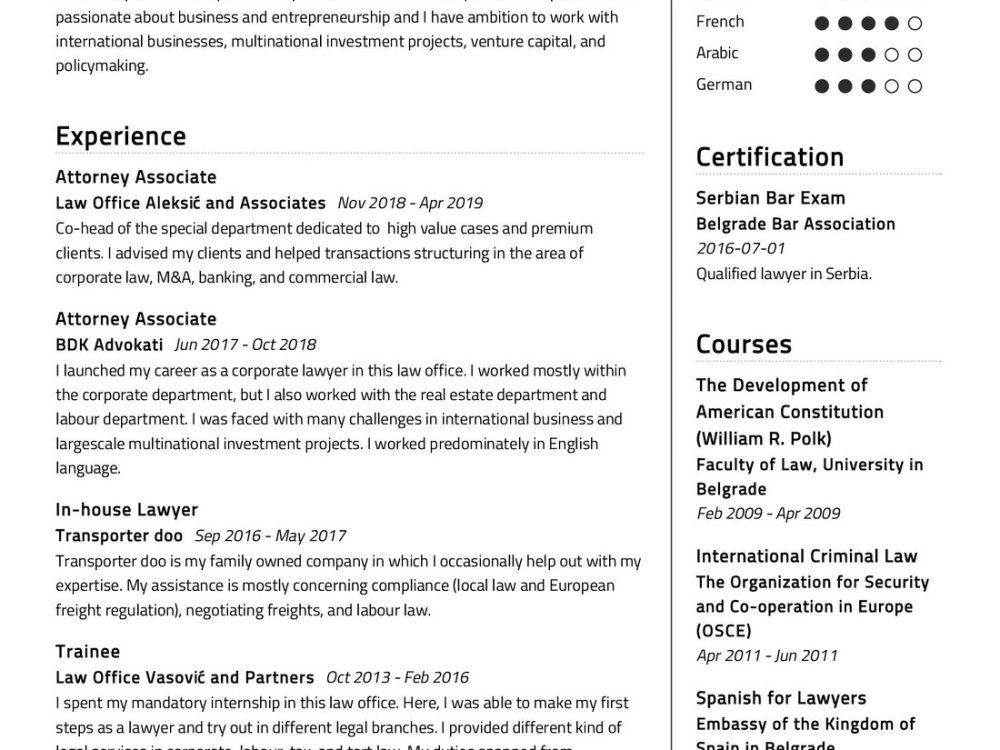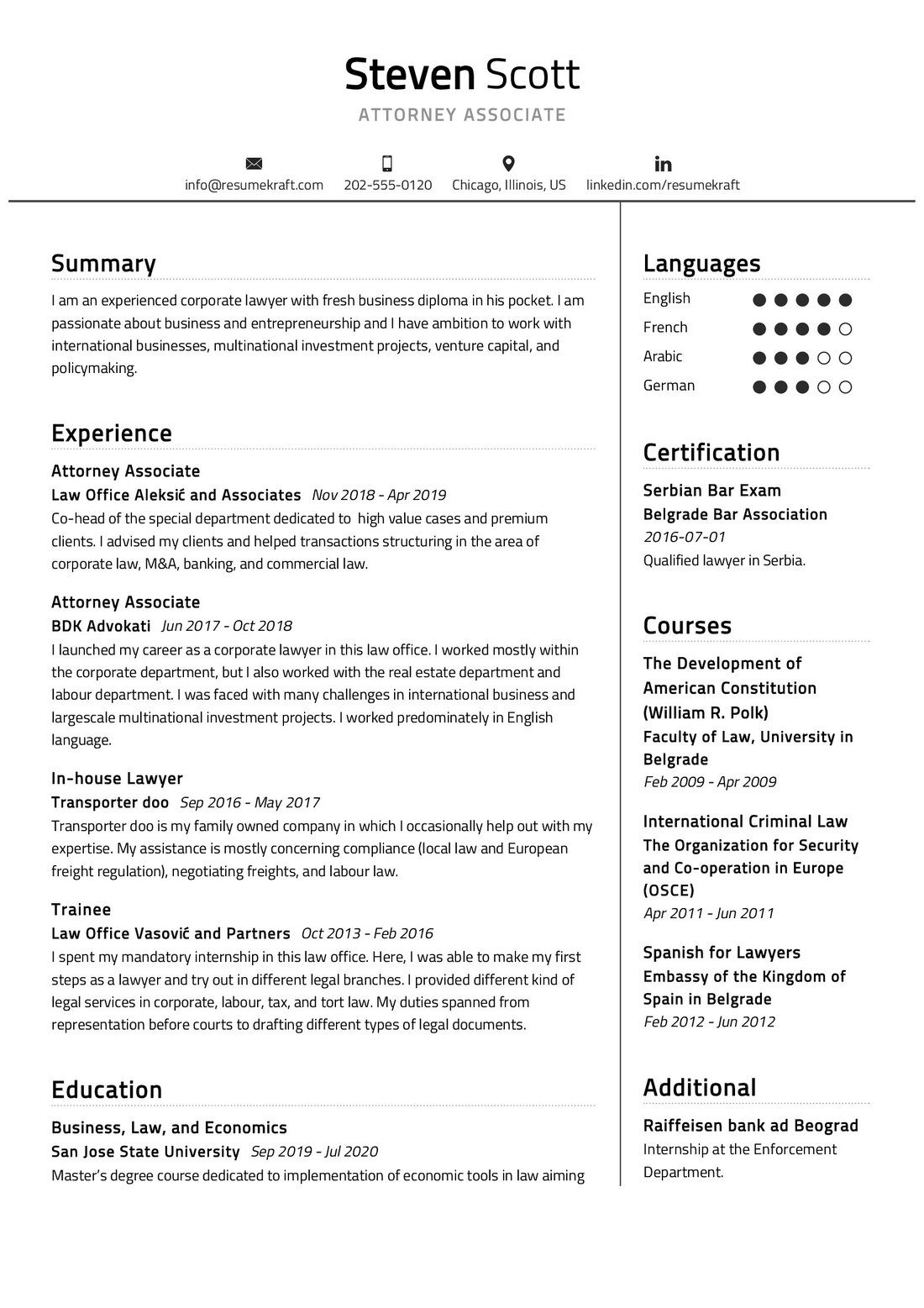What is the Role of an Attorney Associate?
The legal landscape is vast and varied, and within it, the role of an Attorney Associate is both challenging and rewarding. Attorney Associates are the backbone of any law firm, providing essential support to partners and playing a pivotal role in managing client relationships, conducting research, and representing clients in legal proceedings. They delve deep into the intricacies of the law, advocating for justice, and navigating the complex legal waters to secure favorable outcomes for their clients.
What are the Attorney Associate Job Requirements?
Embarking on a career as an Attorney Associate requires a combination of education, skills, and dedication. The journey is demanding, but for those with a passion for law, it is incredibly fulfilling. Here are the foundational requirements for aspiring Attorney Associates:
- A Juris Doctor (JD) degree from an accredited law school, laying the academic groundwork for a career in law.
- Passing the bar examination in the state where they intend to practice, a critical step in becoming a licensed attorney.
- Strong research and analytical skills, enabling them to dissect complex legal issues and build strong cases.
- Excellent communication and interpersonal skills, essential for client interactions and courtroom representations.
- A commitment to ethical practice and maintaining client confidentiality.
Additional certifications or specializations in specific areas of law can further enhance an Attorney Associate’s profile and open up new career opportunities.
What are the Responsibilities of an Attorney Associate?
The day-to-day life of an Attorney Associate is diverse, encompassing a range of responsibilities that require both legal knowledge and practical skills. Here’s a closer look at what this role entails:
- Conducting legal research and analysis to support case preparation and strategy development.
- Drafting legal documents, including contracts, pleadings, and motions.
- Representing clients in court hearings, arbitration, and mediation sessions.
- Communicating with clients, opposing counsel, and court officials.
- Supporting partners and senior attorneys in case management and trial preparation.
- Staying updated on current laws, regulations, and legal trends affecting their practice area.
Each responsibility is a stepping stone towards building a successful legal career and making a meaningful impact in the field of law.
Attorney Associate Resume Writing Tips
Creating a compelling Attorney Associate resume is a strategic endeavor, requiring careful consideration and attention to detail. Here are some tailored tips to help you present your qualifications and experiences effectively:
- Highlight your legal education and bar admission prominently, showcasing your foundational qualifications.
- Detail your experience in legal research, case preparation, and client representation, providing specific examples of cases you’ve worked on.
- Include any areas of specialization or additional certifications you’ve earned, demonstrating your expertise in specific areas of law.
- Emphasize your communication and interpersonal skills through examples of client interactions and courtroom experiences.
- Proofread meticulously to ensure your resume is polished and free of errors.
Remember, your resume is a reflection of your professional journey in law, so make it count!
Attorney Associate Resume Summary Examples
The resume summary is your elevator pitch, providing a snapshot of your qualifications and experiences. Here are some examples to inspire you:
- “Dedicated Attorney Associate with a strong background in corporate law, experienced in contract drafting, negotiation, and litigation. Committed to providing exceptional legal support and advocating for clients’ interests.”
- “Detail-oriented Attorney Associate specializing in family law, with a proven track record of successful mediation and trial representation. Passionate about ensuring justice and upholding clients’ rights.”
- “Dynamic Attorney Associate with expertise in intellectual property law, adept at patent filing, trademark registration, and infringement litigation. Committed to protecting clients’ intellectual assets and navigating complex legal landscapes.”
Each summary should encapsulate your unique strengths and experiences, setting the tone for the rest of your resume.
Create a Strong Experience Section for Your Attorney Associate Resume
The experience section is the cornerstone of your resume, showcasing your journey in the legal field. Here are some examples to guide you in detailing your experiences:
- “Successfully represented a tech startup in a patent infringement lawsuit, securing a favorable settlement and protecting the client’s intellectual property rights.”
- “Conducted comprehensive legal research and analysis for a high-profile criminal defense case, contributing to a successful verdict for the client.”
- “Drafted and negotiated multiple commercial contracts for corporate clients, ensuring compliance with applicable laws and safeguarding clients’ interests.”
Each experience is a testament to your skills and contributions in the legal field, so be specific and highlight your achievements.
Sample Education Section for Your Attorney Associate Resume
Your education section should reflect your academic achievements and qualifications in law. Here’s an example:
- Juris Doctor (JD), Harvard Law School, Cambridge, MA, 2020
- Bar Admission, New York State, 2021
- Certificate in Corporate Law, American Bar Association, 2022
Your academic journey is the foundation of your legal career, so showcase it with pride!
Attorney Associate Skills for Your Resume
As an Attorney Associate, your skills are your arsenal, enabling you to navigate the legal field effectively. Here are some skills to consider including:
Soft Skills:
- Communication
- Research
- Analysis
- Client Relations
- Time Management
Hard Skills:
- Legal Research and Writing
- Contract Drafting and Negotiation
- Litigation
- Regulatory Compliance
- Case Management
Each skill is a building block, contributing to your effectiveness as an Attorney Associate.
Most Common Mistakes to Avoid When Writing an Attorney Associate Resume
Avoiding common mistakes is crucial in crafting a standout resume. Here are some pitfalls to watch out for:
- Using a generic template and not tailoring your resume to the specific job application.
- Listing responsibilities without highlighting achievements and contributions.
- Overloading your resume with legal jargon and not making it accessible to non-legal hiring managers.
- Ignoring the importance of a well-crafted cover letter to accompany your resume.
- Failing to proofread and submitting a resume with typos or grammatical errors.
Avoiding these mistakes will help you present a polished and professional image to potential employers.
Key Takeaways for Your Attorney Associate Resume
As we conclude, let’s recap the essential elements to consider when crafting your Attorney Associate resume:
- Highlight your legal education, bar admission, and any areas of specialization.
- Detail your experiences in legal research, case preparation, and client representation, providing specific examples.
- Emphasize your skills in communication, analysis, and legal writing.
- Avoid common mistakes and present a polished, tailored, and compelling resume.
Finally, feel free to utilize resources like AI Resume Builder, Resume Design, Resume Samples, Resume Examples, Resume Skills, Resume Help, Resume Synonyms, and Job Responsibilities to create a standout application and prepare for the Attorney Associate job interview.
Armed with this comprehensive guide and the resources available at Resumekraft, you are well on your way to crafting a resume that reflects your legal prowess and passion for justice. Best of luck in your career journey!



